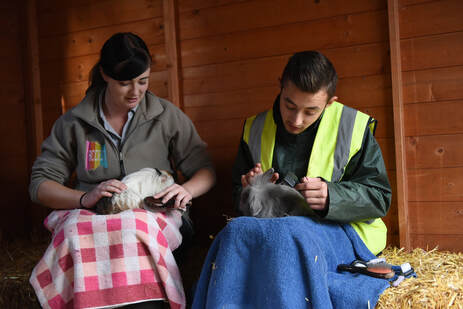Caring for Animals and Wildlife in Winter
20th January 2020
What does caring for farm animals and wildlife look like during the Winter months? Animal Care Trainer Lauren Cooper-Rawson gives an insight into Access’ full-time programme on animal care for the large and small, and how we can all play a part.
Animal care in Winter
Caring for animals in Winter is, quite literally, an opportunity for animal care learners and apprentices at Access to take stock. For those sites such as city farms and parks that welcome visitors and which are quieter during this season, it’s an opportunity to deep clean the animals’ living areas, audit the stock room and undertake more regular health checks.
Preparation work also begins on advertisement drives to attract new visitors for the next busy season of Spring.
Which animals do Access learners support?
We care for a huge variety of animals through our training programmes; from feline and canine at RSPCA kennels to hoof stock like sheep and ponies, through to smaller creatures like rabbits and guinea pigs.
What about wildlife?
We’re as passionate about caring for wild animals as we are farm animals. As part of Access’ enrichment programme, we encourage our learners to put activities such as creating bird feeders into use at home.
How can we all support our wildlife over the colder months?
Birds must feed often to maintain their body weight. Frozen ground in Winter makes it difficult to feed on soil-dwelling small invertebrates.
Whilst different birds prefer different foods (blackbirds enjoy fatty treats and mealworms, blue tits like seeds and finches like sunflower hearts), offering a variety of kitchen scraps will encourage birds of all varieties to visit your garden over Winter months:
It’s also a great opportunity to record which feeders visit through January’s Big Garden Bird Watch. More information is available at: https://www.rspb.org.uk.
As a threatened species in the UK, hedgehogs too could do with a helping hand:
Food should be chopped finely and, if temperatures start to drop, biscuits favoured over tinned food (which tends to freeze quickly).
Further advice is available at: https://thehedgehog.co.uk.
More information on careers in Animal Care is available from Access Training, www.atem.co.uk, tel: 0330 002 6266, [email protected].
Animal care in Winter
Caring for animals in Winter is, quite literally, an opportunity for animal care learners and apprentices at Access to take stock. For those sites such as city farms and parks that welcome visitors and which are quieter during this season, it’s an opportunity to deep clean the animals’ living areas, audit the stock room and undertake more regular health checks.
Preparation work also begins on advertisement drives to attract new visitors for the next busy season of Spring.
Which animals do Access learners support?
We care for a huge variety of animals through our training programmes; from feline and canine at RSPCA kennels to hoof stock like sheep and ponies, through to smaller creatures like rabbits and guinea pigs.
What about wildlife?
We’re as passionate about caring for wild animals as we are farm animals. As part of Access’ enrichment programme, we encourage our learners to put activities such as creating bird feeders into use at home.
How can we all support our wildlife over the colder months?
Birds must feed often to maintain their body weight. Frozen ground in Winter makes it difficult to feed on soil-dwelling small invertebrates.
Whilst different birds prefer different foods (blackbirds enjoy fatty treats and mealworms, blue tits like seeds and finches like sunflower hearts), offering a variety of kitchen scraps will encourage birds of all varieties to visit your garden over Winter months:
- Fat from unsalted cuts of meat.
- Fruit and vegetables (even roast potatoes).
- Cheese (except very strong or blue cheese).
- Dried fruit.
- Biscuits, cake and pastry.
It’s also a great opportunity to record which feeders visit through January’s Big Garden Bird Watch. More information is available at: https://www.rspb.org.uk.
As a threatened species in the UK, hedgehogs too could do with a helping hand:
- Tinned cat or dog food.
- Meat-flavoured cat biscuits.
- Bird nuts.
- Mild cheese.
- Cooked leftover chicken or mince.
- Specific hedgehog food from pet shops.
Food should be chopped finely and, if temperatures start to drop, biscuits favoured over tinned food (which tends to freeze quickly).
Further advice is available at: https://thehedgehog.co.uk.
More information on careers in Animal Care is available from Access Training, www.atem.co.uk, tel: 0330 002 6266, [email protected].
Share this post
















